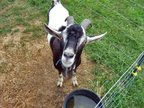In the minds of some people, goat care is so easy you simply put hay in front of the animals. They are of the belief that feeding is all the care goats need at all. This, plus what was thought of goats before – that they can eat anything from cans, to cartoons and paper, to fabric and even scraps of plastic.
All these are not true, indeed.
Nutrition
Goat care is not that simple, and this is most evident in their nutritional feeding needs. Goats need year-round provisions of roughage like pasture, browser grass leaves or well-cured hay.
Young animals with inadequate nutrition in their diets are prone to diseases and will not reach their growth potential.
Those that are milking (does), the growing stocks (kids) and those used for breeding (bucks) need their daily rations of legume hay like alfalfa. For goat meat raisers, nutritious feeds for the herd take up the largest chunk of their expenses.
Goats need proteins, vitamins and minerals for energy, just like any other animal. Calorie-giving foods are the most limited while proteins are the most expensive.
Nutritional deficiencies as well as excesses (and other food imbalances) limit the goat’s growth and development and can lead to various health problems. They also need a lot of fiber for digestive well-being and plenty of water.
The nutritional requirements of goats also depend on several factors: present growth rate (kids), maintenance, lactation (for does), activity and the environment (cold or hot weather, etc).
Feeds
Generally, food consumption of goats is equivalent to about 3% of their body weight. The exact amount varies according to the animal’s size.
Pasture and browse food are the most economical source of food (and nutrients) for the animals. Pasture is high in energy and protein content. However, it has high moisture content and the animals have to eat enough to meet their needs.
In cold season, hay is the primary nutrient source food. Legume hays (alfalfa, clover) have higher proteins, vitamins and minerals than grass hays. The nutritional content, however, depends on the maturity of the foliage when it was cut for storage.
Silage (from forage or grain crops) are also fed to goats. Care is needed to check on the quality of silage when feeding the animals. (Molds cause ‘circling disease’ in goats.)
Raisers usually provide additional food supplements to their animals in the form of grain concentrates. This is to provide additional nutrients that forage alone cannot give.
These protein supplements are derived from both animal and plant sources: soybean meals, cottonseed, and fish meal. Proteins are not stored in goats but burned or eliminated by the kidneys.
Some companies now offer feeds in pellet forms, marketing them as “complete” goat food. These are advantageous because goats who are very selective eaters cannot sort the feed ingredients in pellets.
Salt, calcium and phosphorus are the most important minerals needed by goats. They also need vitamins A, D, and E. Some grain rations already incorporate these vitamin-mineral pre-mixes.
Access to clean, fresh water is necessary for the animals. A mature goat drinks almost a gallon and a half every day. Inadequate water intake causes health problems.
Goat care is almost like that of other animals, including pets, even humans. All our nutritional needs are different only in quantities, but everything is the same.







No comments:
Post a Comment